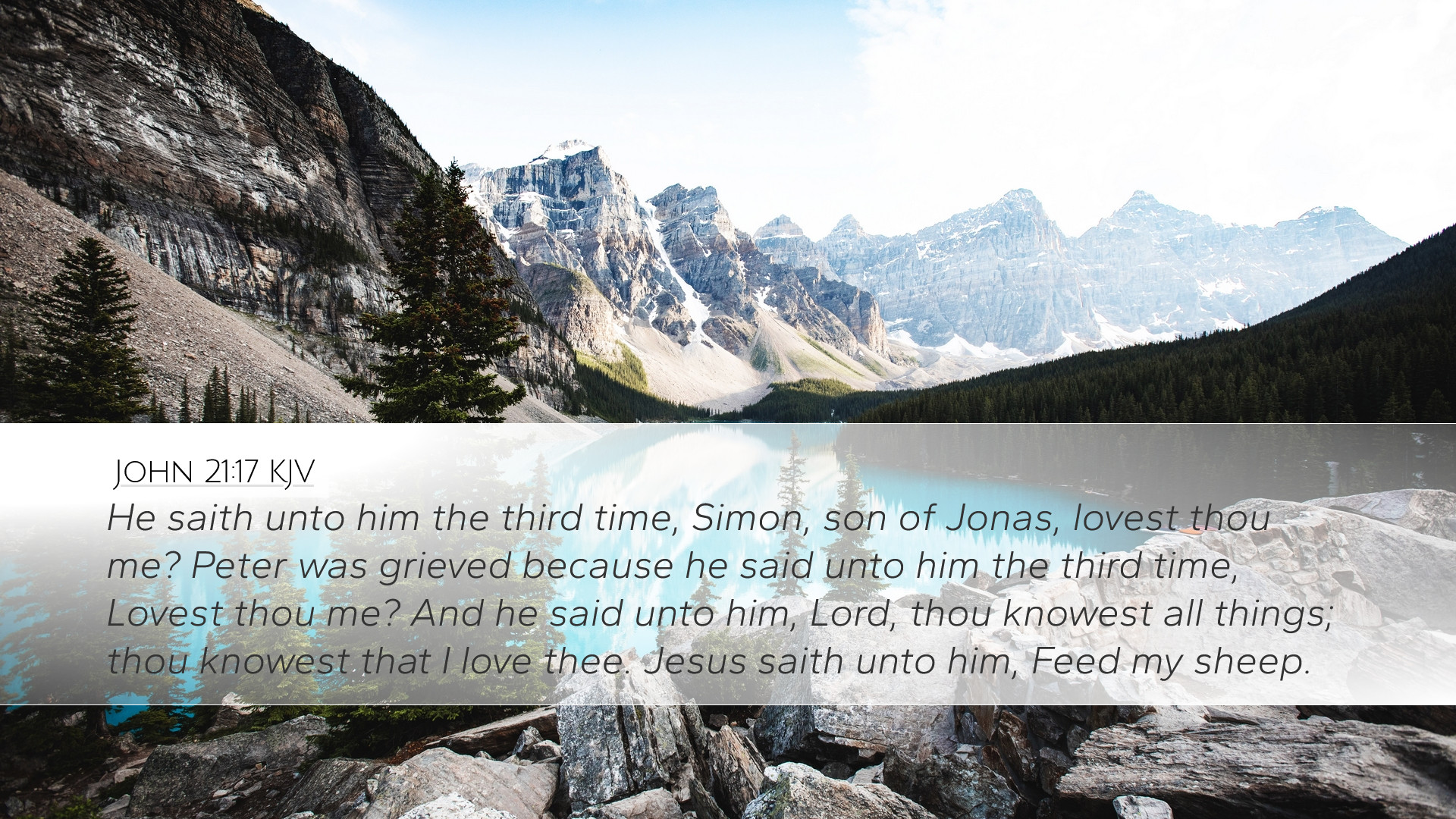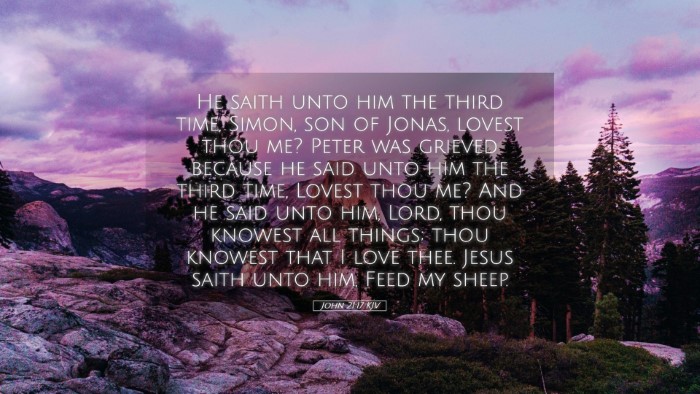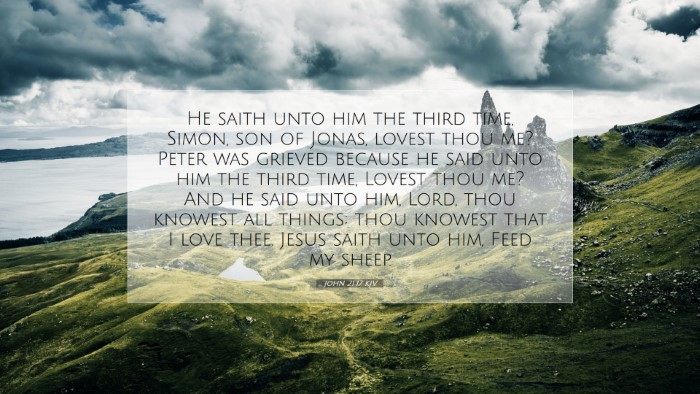Old Testament
Genesis Exodus Leviticus Numbers Deuteronomy Joshua Judges Ruth 1 Samuel 2 Samuel 1 Kings 2 Kings 1 Chronicles 2 Chronicles Ezra Nehemiah Esther Job Psalms Proverbs Ecclesiastes Song of Solomon Isaiah Jeremiah Lamentations Ezekiel Daniel Hosea Joel Amos Obadiah Jonah Micah Nahum Habakkuk Zephaniah Haggai Zechariah MalachiJohn 21:17
John 21:17 KJV
He saith unto him the third time, Simon, son of Jonas, lovest thou me? Peter was grieved because he said unto him the third time, Lovest thou me? And he said unto him, Lord, thou knowest all things; thou knowest that I love thee. Jesus saith unto him, Feed my sheep.
John 21:17 Bible Commentary
Commentary on John 21:17
Verse: "He saith unto him the third time, Simon, son of Jonas, lovest thou me? Peter was grieved because he said unto him the third time, Lovest thou me? And he said unto him, Lord, thou knowest all things; thou knowest that I love thee. Jesus saith unto him, Feed my sheep."
Introduction
John 21:17 is a pivotal verse in the Gospel of John, encapsulating the restoration of Peter after his denial of Jesus. This passage highlights the themes of love, forgiveness, and pastoral responsibility. Various public domain commentaries provide valuable insights into the text that can enhance our understanding of its significance for pastors, scholars, and students alike.
Contextual Overview
The passage occurs post-resurrection when Jesus meets His disciples by the Sea of Tiberias. It is crucial to recognize the social and emotional backdrop of this encounter:
- Peter's Denial: Prior to the crucifixion, Peter denied knowing Christ three times (John 18:15-27). His denial was a pivotal moment that left him in distress.
- Jesus' Resurrection: After the resurrection, Jesus' appearance to the disciples signifies hope and restoration, preparing them for their future ministry.
Analysis of the Text
1. The Threefold Question
In asking Peter three times, "Lovest thou me?" Jesus not only reinstates Peter but also emphasizes the depth of Peter's love. This repetition draws parallels to Peter's three denials, creating a powerful moment of reconciliation.
- Matthew Henry: He emphasizes that Jesus, in His omniscience, knew Peter would betray him; hence, this conversation signifies Peter's restoration and commitment to the Lord.
- Albert Barnes: Barnes notes that Jesus uses different words for 'love' (agape and philia) during the questioning, enriching the meaning of Peter's response and the nature of his love for Christ.
2. The Emotional Weight
The text indicates that Peter was "grieved" upon hearing the third inquiry. This grief reveals several elements:
- Conscience and Repentance: Peter's awareness of his previous denials weighs on him. It signifies a moment of self-examination and genuine repentance.
- Human Emotion: The passage illustrates that God seeks authentic relationships, and Peter’s emotional reaction is a testament to the depth of his fondness for Jesus.
The Response of Peter
Peter responds firmly, "Lord, thou knowest all things; thou knowest that I love thee." This affirmation speaks volumes about Peter's acknowledgment of Christ’s divine knowledge:
- Adam Clarke: Clarke underscores that Peter’s declaration of love is coupled with the acknowledgment of Jesus' omniscience, reflecting a profound awareness of the Lord's presence and authority in his life.
- Theological Implications: As scholars observe, Peter’s response is not merely about love; it points to profound trust and submission to Christ, which is foundational for future ministry.
The Call to Ministry
After Peter asserts his love, Jesus commands him, "Feed my sheep." This directive has multiple dimensions:
- Pastoral Responsibility: Jesus appoints Peter as a leader in His church. The term "feed" indicates the necessity of teaching and nurturing believers.
- Shepherding as a Theme: This theme is woven throughout Scripture (e.g., Psalm 23, Ezekiel 34). Jesus positions Peter as a shepherd to care for His followers, highlighting the importance of benevolent leadership in the church.
- The Role of Elders: Scholars argue that this passage has implications for church governance, underscoring the role of elders as caretakers of the flock.
Conclusion
John 21:17 encapsulates a significant moment in the life of Peter and the early church. Through answering Jesus' questions about love and accepting the call to shepherd the flock, Peter transitions from a state of failure to one of restoration and empowerment. This passage addresses essential themes of love, accountability, and the responsibilities of leadership.
The insights gleaned from Matthew Henry, Albert Barnes, and Adam Clarke highlight the depth of this exchange and its importance for contemporary ministry, reminding pastors, students, and theologians of the love and grace of Christ that reinstates and commissions.


